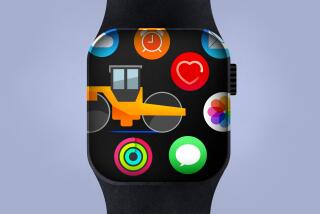How Apple’s Newton Defies the Laws of Price Motion
- Share via
These days, when Apple Computer dreams of its future, it dreams of a day when personal digital assistants will be as common as VCRs.
Alas, for Apple, AT&T;, Motorola, Matsushita and the rest of the computer electronics industry, early efforts to market these pocket-size personal information processors have proven something less than successful.
Why? Because it’s tough to figure out which innovators are being more shortsighted--the Americans or the Japanese. It’s not that these companies are stupid or foolish or lazy; it’s that they haven’t exercised the necessary self-discipline to learn from their success. Is it any wonder that America effectively has no real consumer electronics industry?
These companies have been so intent on launching PDAs that capture the high end of the marketplace that they’ve foolishly neglected the mass market. Instead of growing this market from the bottom up, companies are trying to build it from the top down. That’s a strategic mistake and it’s going to cost them.
For example, Apple’s Newton MessagePad truly is a nifty piece of personal technology that enables people to scribble notes and organize their information in a dramatically accessible way; unfortunately, it feels more like a production prototype than a finished tool.
In too many ways, the Newton is eerily reminiscent of the early Macintosh computer--clever, provocative, perhaps a year away from true functionalism and uncomfortably overpriced. In other words, it’s far more intriguing than compelling.
Originally, Apple Chairman John Sculley wanted his Newton engineers to design the machine to cost less than $500. They failed miserably. Instead of figuring out a way to produce a lower-cost machine, Apple let the price jump 50%. The result is today’s $750-plus machine. Sure, the price is going to come down, but that’s not the point. If you really want to define and dominate a consumer electronics marketplace--which is what Sculley’s Apple has long claimed it wants to do--then you have to have the courage and discipline to design to price.
The Japanese hardware companies can do it; the Korean companies can do it. American hardware companies apparently can’t or won’t, because they still cling to the 1950s industrial notion that higher prices signal higher value.
The truly gutsy thing for Apple to have done would have been to offer a low-end Newton for less than $300. How about a bare-bones model for $99.95? So where does Apple make its big money? From upgrades and enhancements! Bill Gates didn’t get to be a billionaire by charging premium prices for Microsoft Windows; he became a billionaire by pricing Windows at less than $100. Volume, volume, volume--and then you become the standard by which all others are measured and judged.
AT&T--which; you’d think would understand something about managing a low-priced mass market in personal communications--has its Eo personal digital assistant, which is even more expensive than Newton. Tandy’s new Zoomer PDA is also priced on the very high side.
What gives? Don’t these people remember that sales for VCRs, personal computers and cellular phones didn’t take off until the prices plummeted? Haven’t they learned that it’s far easier to move up the value chain to the high end rather than slash and burn prices from the high end to compete in the mass market? Guess not. People care about price and performance--with the accent on price.
But let’s not let the Japanese off the hook here, either. Sharp and Casio dominated the comparatively small but potentially enormous personal organizer market with their Wizards and Bosses. But just as American computer companies don’t understand consumer prices, Japanese consumer electronics companies don’t understand systems.
For example, it would have been a snap for Sharp Electronics to license the right to manufacture memory cartridges for its popular Wizard line. That way, third-party companies could have a powerful incentive in developing interesting applications in telecommunications, paging and note taking for the machines.
With that kind of strategy, Sharp could conceivably offer 80% of a Newton for less than 25% of the cost. But does Sharp license its cartridge technology? No. The result is that Sharp condemned itself to a niche market instead of creating a PDA infrastructure that could become a global standard.
Interestingly, Sharp and other Japanese companies have licensed Newton technology from Apple--but you can be sure the licensing agreement creates some sort of pricing protection umbrella. Apple is, of course, smart to be licensing the Newton software at this early stage. What’s not so smart, however, is the field-of-dreams marketing approach to PDAs: If you build it, they will come.
Sorry, but they will only come if the price is right.


![Monrovia, CA - November 06: Original Apple-1 "NTI" motherboard and an Apple Cassette Adapter (ACI) in an original ByteShop Apple-1 koa wood case with Datanetics Keyboard Rev D [keyboard dated: Sept 21 1976] partnered with a 1986 Panasonic video monitor [model no. TR-930U; serial no. KA6320206; dated: MAY 1986]. Hand-built Apple-1 displayed for auction at John Moran Auctioneers on Saturday, Nov. 6, 2021 in Monrovia, CA. (Irfan Khan / Los Angeles Times)](https://ca-times.brightspotcdn.com/dims4/default/cc39de4/2147483647/strip/true/crop/2393x1600+4+0/resize/320x214!/quality/75/?url=https%3A%2F%2Fcalifornia-times-brightspot.s3.amazonaws.com%2F3c%2Fdc%2F63ce0c974dd9852f7e9d0ac5f4cd%2Fla-photos-1staff-868241-me-1106-apple-first-unit-001.IK.JPG)



